| Srl | Item |
| 1 |
ID:
102120
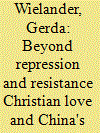

|
|
|
| 2 |
ID:
106917
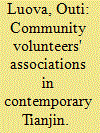

|
|
|
|
|
| Publication |
2011.
|
| Summary/Abstract |
The Community Volunteers' Associations (CVAs) are among the oldest grassroots organizations in contemporary China and as such provide a valuable case for a study of China's fast-growing non-profit sector. The author defines CVAs as multipurpose partners of the party-state in its pursuit of social stability and maintenance of legitimacy. In this role, the CVAs have served three major tasks. They have provided social services, acted as a link between the party-state and urban residents, and served as a medium for shaping values. The article explores the definition and redefinition of these tasks as well as the actual operations of the associations since the late 1980s.
|
|
|
|
|
|
|
|
|
|
|
|
|
|
|
|
| 3 |
ID:
186604
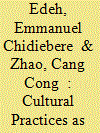

|
|
|
|
|
| Summary/Abstract |
China’s One Belt One Road (OBOR) centres on building a harmonious world, by reorienting the already tumultuous international community, towards the path of sustainable, peaceful and harmonious coexistence. From a cultural perspective, the OBOR is a heritage, an embodiment of brilliant civilization, glorious historic past and extraordinary creativity of mankind. It harbours both tangible and intangible representations of the values, beliefs, traditions and lifestyles of prior generations that are valuable to the present generations. Evidence of historical socioeconomic development and intricacies thrived on the exchange of cultural values shared by all mankind. By drawing from diverse conceptual frameworks embedded in traditional Chinese cultural values, the study offers an insightful illustration of cultural practices in contemporary China’s socioeconomic development through the OBOR. Capturing how cultural values underpins the socioeconomic development pattern in OBOR, geopolitical decisions and actions aimed at managing conflicts and the inclusive nature of OBOR.
|
|
|
|
|
|
|
|
|
|
|
|
|
|
|
|
| 4 |
ID:
130977
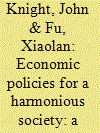

|
|
|
|
|
| Publication |
2014.
|
| Summary/Abstract |
China's remarkable economic growth has produced dramatic structural and socioeconomic change.
Economic growth has solved many problems but the accompanying changes in the economy and
society have brought new problems to the fore. This has been recognized by China's Government
in the recent emphasis that it has placed on the need to create a "harmonious society." The new
leadership will wish to devise new policies for the current challenges and those ahead
|
|
|
|
|
|
|
|
|
|
|
|
|
|
|
|
| 5 |
ID:
097381
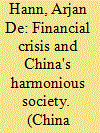

|
|
|
| 6 |
ID:
101938
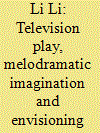

|
|
|
|
|
| Publication |
2011.
|
| Summary/Abstract |
The television play has been recognized by scholars as the most influential genre in the flourishing television industry in China's new media landscape; yet little critical attention has been given to inquiry of why and how it functions as a dynamic cultural agent in the Chinese people's reconfiguration of their past and imagining of their everyday life. This paper investigates the intriguing socio-historical environment from which the genre emerged and its unique modes of operation by focusing on the television play of sentiment. It demonstrates that the television play embodies the many complex aspects of social forces and relationships contested in China's reform, suggesting, all at once, commercialization in Chinese society, the popular imaginary of morality and the state's conceptualization of a 'harmonious society', a strategic policy aiming at maintaining social balance while bypassing some of the thorny political questions in the post-revolution era.
|
|
|
|
|
|
|
|
|
|
|
|
|
|
|
|
| 7 |
ID:
101850
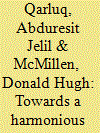

|
|
|
|
|
| Publication |
2011.
|
| Summary/Abstract |
Currently, the construction of a 'Harmonious Society' is an important yet challenging official project in the People's Republic of China. Under Chinese Communist Party supervision, the government has undertaken some measures to achieve this goal. In the country's capital, Beijing, the majority society ('social majority') is composed of peoples considered to be Han Chinese. but the population there also includes representatives from 55 recognised minority society groups. Many such latter groups, especially Uyghurs and Tibetans, have long maintained distinctive cultural traditions, practices, languages, and 'memories' from those of the majority society - and are 'different' in physical appearance, customary dress and other features. Officially, however, all are 'Chinese citizens'. Recently, some negative and disharmonious trends have appeared in majority-minority relations. Based on academic fieldwork research, this essay focuses on 'Uyghur intellectuals' in Beijing, analytically discussing their relationships with the majority society there, identifying issues and problems in those relationships, and offering informed, constructive suggestions to achieve a more 'Harmonious Society' in China.
|
|
|
|
|
|
|
|
|
|
|
|
|
|
|
|